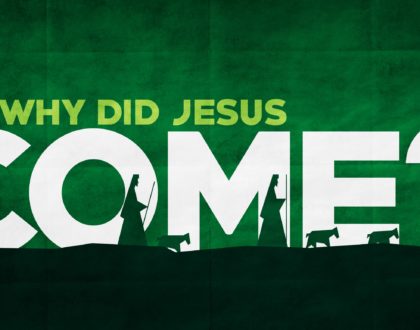Being About God’s Business

by Pastor Gene
One of the most poignant moments in Charles Dickens’ A Christmas Carol has the ghost of Scrooge’s former business partner Jacob Marley paying him and uninvited visit. “You were always a good businessman,” Scrooge tells the ghost. The ghost replies, “Mankind was my business. The common welfare was my business; charity, mercy, forbearance, and benevolence were, all, my business. The dealings of my trade were but a drop of water in the comprehensive ocean of my business!”
Well as it turns out, Marley’s ghost is speaking a biblical truth! ‘Mankind’ is the business of every believer because mankind is the Father’s business. And like Jesus, we must be about our Father’s business!
The People We Bump Into
There are people that the Lord just simply puts in our path: people we work with, but didn’t hire; people who study beside us in class, who we had nothing to do with enrolling; people in our neighborhood, across the street or around the block. Their mailbox sits right next to our mailbox. We didn’t seek them out, their just there. The ‘natural’ man would call that a coincidence, but the ‘spiritual. man knows better: God is always working and He’s placed them in my path (John 5:17).
From time to time these people find themselves in trouble – maybe it’s financial trouble or some problem with their health. Whatever the case, they’re in trouble and we’re passing by and we see it. We didn’t ask to see it, but we do.
These are the people we happen upon, the people we just seem to bump into in life.
It’s like the man the Samaritan ‘happened upon’ lying in the road, robbed, beaten and left for dead. The Samaritan – unlike the priest and the Levite who were supposed to have known God – could not look away and pretend that he hadn’t seen what he’d seen. He made the injured man’s welfare his own business (Luke 10:25-29).
Because ‘people’ are the Father’s business, they need to be ours as well. Looking the other way is just not an option available to those who are following Jesus. Notice:
“If a brother or sister is poorly clothed and lacking in daily food, and one of you says to them, ‘Go in peace, be warmed and filled,’ without giving them the things needed for the body, what good is that?” (James 2:15-16)
“Whoever has two tunics is to share with him who has none, and whoever has food is to do likewise” (Luke 3:11).
“But if anyone has the world’s goods and sees his brother in need, yet closes his heart against him, how does God’s love abide in him? Little children, let us not love in word or talk but in deed and in truth” (1 John 3:17-18).
The People We Seek
But God raises the bar even higher with respect to making God’s business our business. Not only are we to care about those we bump into, but we’re to “seek” opportunities to bless others!
“Always seek to do good to one another and to everyone” (1 Thessalonians 5:15b).
“So then, as we have opportunity, let us do good to everyone, and especially to those who are of the household of faith” (Galatians 6:10).
It’s no wonder that James writes: “Religion that is pure and undefiled before God, the Father, is this: to visit orphans and widows in their affliction, and to keep oneself unstained from the world” (1:27).
To VISIT orphans and widows is to SEEK an opportunity to do good. To do that, we have to plan for it, drive to where they are, and visit them in their distress. This is God’s love in action!
The Moment After Their Death
Perhaps the greatest expression of love we can have for those around us is to care about what they will experience the moment after their death.
Jim Dennison recently wrote about the death of the American missionary John Allen Chau. John was a twenty-six-year-old native of Vancouver, Washington who led missionary trips around the world for Christ. Dennison writes:
This month, he traveled to the North Sentinel Island in India’s Bay of Bengal to share Christ with the Sentinelese tribe. Its members have been isolated for centuries, rejecting all contact with the larger world and reacting with violence when outsiders have attempted to interact with them. Their island is off-limits to visitors under Indian law.
Chau hired local fishermen to transport him within half a mile of the island. He then used a canoe to reach the island’s shore, returning later in the day.
On his second trip, the tribespeople broke his canoe, forcing him to swim back to the boat. On his third trip, he did not come back. The fishermen said they later saw tribespeople dragging his body around.
Indian authorities have now begun the arduous work of trying to retrieve Chau’s body without triggering a conflict with the islanders.
Before he left the boat for the last time, Chau wrote a note to his family. “You guys might think I’m crazy in all this but I think it’s worthwhile to declare Jesus to these people,” he said.
Then he added: “Please do not be angry at them or at God if I get killed–rather please live your lives in obedience to whatever He has called you to and I will see you again when you pass through the veil.” …
[But] was it appropriate for him to seek contact with people who clearly did not want him on their island? Here’s the larger theological question: Do the North Sentinelese need to hear about Jesus?
Our secular culture would answer loudly in the negative. “Live and let live” is the mantra of our day. We should expect secular people to think this way. In their worldview, all truth claims are relative and tolerance is the highest value.
As a result, a Christian who shares the gospel with others is seen as forcing his or her beliefs on them. It’s conventional wisdom today that we might witness with our lives, but we should avoid offending people with our words … Here’s the problem: it’s necessary to use words.
Paul asked: “How then will they call on him in whom they have not believed? And how are they to believe in him of whom they have never heard? And how are they to hear without someone preaching?” (Romans 10:14)
The “gospel” is literally the “good news” that Jesus died for our sins and calls us to repent of them and trust him as our Savior and Lord. These are cognitive facts that must be communicated to be understood and believed. Those who understand and believe them have a moral duty to share them with those who do not.
Here’s my point: whatever we think of John Chau’s methods, it is vital that we imitate his passion.
Amen and amen!
Making Mankind “My” Business
When Mary and Joseph found Jesus in the temple after having lost track of him for several days, He was busy confounding the teachers of His day.
Understandably upset, Mary said to Him, “Son, why have You done this to us? Look, Your father and I have sought You anxiously.”
Jesus answer? “And He said to them, Why did you seek Me? Did you not know that I must be about My Father’s business?” (Luke 2:48-49, NKJV)
Luke goes on to tell us that Mary and Joseph “did not understand the statement which He spoke to them.” We still don’t.
Jesus told us a thousand times in a thousand ways that His life was wholly devoted to the Father’s business. “I always do the things that are pleasing to Him,” He said (John 8:29).
Jesus was always about His Father’s business, He always sought to do the things that pleased Him. And those of us who would call ourselves His followers should do no less.
“Follow me,” Jesus told His earliest followers, “and I will make you become fishers of men” (Mark 1:17). That sounds like simple math: If we’re truly following, we’re fishing; if we’re not, well, we’re not really following.
Christmas is a time when hearts are often more open to a word about Jesus than at other times. Those around us may be more apt to take us up on an invitation to come to church or some other Christ-centered event.
We have to care enough about them to use our voice, and our hands and feet, to tell them about the love the Father has for them and all that Jesus has done to prove it.
To consider
- During this Christmas season, what can you do to demonstrate that mankind is your business?
Have you bumped up against someone lately that God wants you to touch?
How has He made the business of those around you your business?
- Do you regularly seek opportunities to do good to others?
Do you look for ways to “let your light shine before others, so that they may see your good works and give glory to your Father who is in heaven”?
What are some of the ways you can move toward a more intentional, active care of others.
- Francis of Assisi famously said, “Preach the gospel at all times. When necessary, use words.” That’s a beautiful thought. In what ways do you preach the Gospel without words?
- But ‘wordless preaching’ can only go so far. There comes a time when you’ve earned a hearing for the Gospel and now have the opportunity to explain what it means to come to Jesus.
Do you know how to communicate the Gospel?
Do you know how to lead someone to Jesus?
Do you look for and take advantage of such opportunities?
- Are you concerned about what those around you will experience the moment after they die?
Are you fishing for men?
Do you wrestle with the ‘following/fishing’ passages?
- What are some of the ways this Christmas season you might actively make mankind your business?
Recommended Posts

Doing Injury to the Gospel
October 06, 2019

Why Did Jesus Come?
December 17, 2018

The Chains We Forge in Life
December 10, 2018
Comments
Comments are closed.

As I wake up this morning, I am reminded that I get 24 hours today to be a pleasing sacrifice to God. I get the same number of hours as everyone else. So I’m asking God: help me notice what you want me to noticed, help me speak the words you want me to speak, help me have a conscious awareness all day long that your Holy Spirit is in me and working. Let your business be my business. No matter the cost.
I tell people about JESUS what he has done for us but some do not want to hear about JESUS it is a shame tha t they do not want to hear about JESUS one day they will wake up and want to no about JESUS I love JESUS
I am not so old in the Lord that I can’t recall when I was one of the ones that DIDN’T want to hear about Jesus. In fact I thought I knew enough about Him to gain entrance into heaven. I praise God for those who truly knew His heart, obeyed His call to witness, and cared for my eternal destiny.
Lori, I love your prayer. I am adopting it.
This message gives me a lot to think about. Thank you Pastor G.